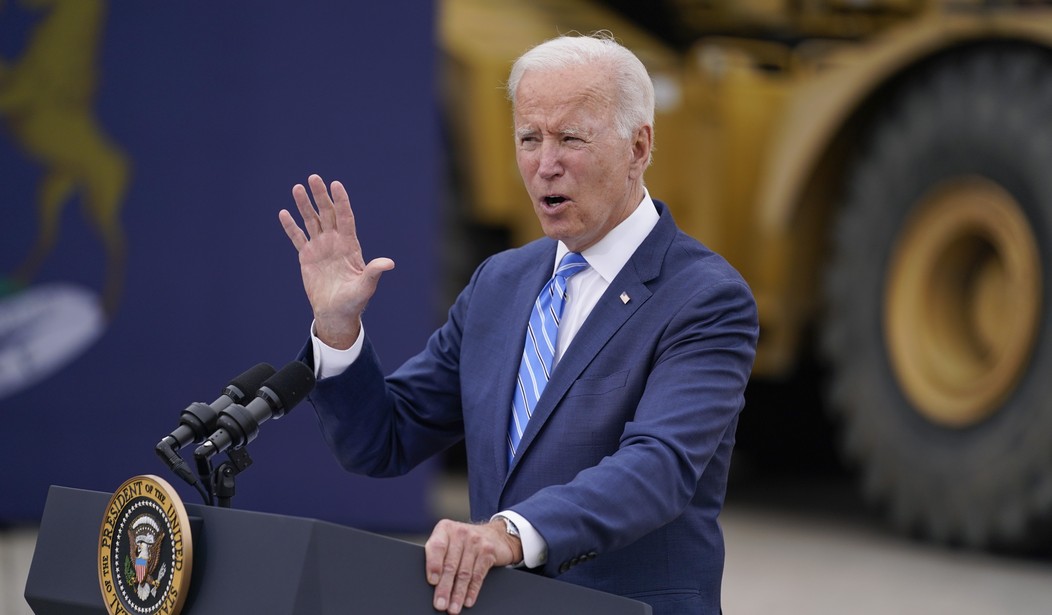Joe Biden’s economy broke two records in November, not one, but don’t expect to hear much bragging at the White House today on either. The two key measures of inflation rose higher than expected, as wholesale prices rose almost by double digits last month:
Wholesale prices increased at their quickest pace on record in November in the latest sign that the inflation pressures bedeviling the economy are still present, the Labor Department reported Tuesday.
The producer price index for final demand products increased 9.6% over the previous 12 months after rising another 0.8% in November. Economists had been looking for an annual gain of 9.2%, according to FactSet.
Excluding food, energy and trade services prices rose 0.7% for the month, putting core PPI at 6.9%, also the largest gain on record. Estimates were for respective gains of 0.4% and 7.2%, meaning the monthly gain was faster than estimates but the year-over-year measure was a bit slower.
The Labor Department’s record keeping for the headline number goes back to November 2010, while the core calculation dates to August 2014.
The Bureau of Labor Statistics produces the PPI, for some reason. They also created a chart showing the dramatic increase in the second half of the year:

Meanwhile, the Bureau of Labor Statistics charts the PPI without food and energy prices, which looks every bit as dramatic:

Does any of this look “transitory,” in anything but the most literal sense? And even in the very literal sense, what exactly is the condition set to which we’re transiting on this path?
The Federal Reserve may ask that very question today, after first providing Joe Biden with the “transitory” explanation:
Federal Reserve officials meet Tuesday and Wednesday for the first time since Chairman Jerome Powell said last month that the central bank needed to shift its focus toward preventing higher inflation from becoming entrenched and away from fostering a rapid rebound in hiring from the pandemic.
The pivot raises the prospect that the Fed’s postmeeting statement—a document parsed by markets as a signal of likely future policy—could be overhauled at the conclusion of their meeting Wednesday.
“There are meetings where you make small changes, and there are meetings where you make larger changes. And this feels to me like a meeting where they’re making larger changes,” said William English, a former senior Fed economist who is now professor at the Yale School of Management. …
Fed officials are poised to quicken the wind down of their bond-buying stimulus program this week because they want to conclude it before raising interest rates. They have signaled they are likely to end it by March instead of June, which would allow them to raise rates sooner. The move to accelerate the process would be the most concrete sign of their shifting inflation outlook.
This sounds like the Fed will signal a significant move on interest rates soon, a decision that will yank back on economic growth. That may not be enough to quell inflation, however. This massive spike in inflation isn’t coming from economic growth, nor is it coming entirely from cheap cash at the Fed. Supply-chain issues, labor policies that have created labor shortages and artificial labor cost spikes, and free-spending Congresses and the Biden administration are the main drivers of this inflationary wave. The Fed can mitigate it to some extent by yanking the choker chain, but as long as Biden and his team plan to spend trillions in off-budget social engineering, the devaluation of the dollar in terms of prices will continue.
None of this will make Joe Manchin any friendlier to the Build Back Better bill. Nor will it make voters any friendlier to Biden or Democrats. This is a political disaster as well as an economic crisis, and the worst part of this is that it was predictable — and predicted.








Join the conversation as a VIP Member